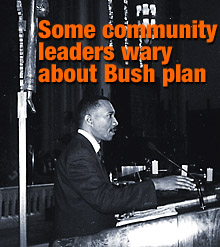|
|
|
|
|
|
|
 |
|
|
NAACP’s Kweisi Mfume at St. Sabina Catholic New World / Michael D. Wamble |
|
By Michael D. Wamble
Staff Writer
The message from some faith-based organizations pondering President
Bush’s proposals for financial and administrative assistance to
such groups, is: Thanks, but no thanks. But not all feel that
way.
Southwest Organizing Project (SWOP) officials don’t believe the
activist organization will be directly affected by President George
W. Bush’s overtures to provide a measure of financial and administrative
assistance to faith-based groups providing social services. In
fact, the project’s leader said he’d be likely to pass up the
opportunity.
“Currently, we receive no government funding and we’d like to
keep it that way,” said Matthew McDermott, SWOP executive director.
The community group has links to several Catholic parishes on
Chicago’s Southwest Side,
“When we see overcrowded schools, predatory lending practices
or crime, we try to tackle that problem by encouraging neighborhood
folks and leaders to become more active,” said McDermott, stressing
the positive aspects fostered by volunteerism and self-sacrifice.
Gary Slutkin, executive director of the Chicago Project for Violence
Prevention, views the yet-to-be-fleshed-out proposal in a different
light.
Since 1999, Slutkin and Cardinal George have been very visible
in promoting the violence prevention project. The cardinal has
helped form a coalition of local religious leaders in support
of programs to end gun violence in Chicago.
On Feb. 15, Cardinal George was scheduled to address the topic
of “Intensifying Our Efforts in CeaseFire,” as head of the Religious
Leadership Task Force, a body within the violence prevention project,
at a local Baptist church.
While Slutkin understands the reservations of groups toward the
financial aspects of Bush’s proposal, he is optimistic about its
long-term results.
“Dependence is something nobody wants, whether it’s dependence
on government or private sources. It isn’t healthy. But these
aren’t either-or questions,” said Slutkin.
“I wouldn’t receive or reject the proposal out of hand,” he said.
On past occasions, both the violence prevention project and SWOP
have received the public backing of the cardinal and local bishops
in the effort to reduce gun violence in neighborhoods and end
predatory lending practices.
McDermott, the former head of the Chicago Coalition for the Homeless,
is not alone in his reservations.
“The church is higher than government. The cross is higher than
the flag,” proclaimed Kweisi Mfume, to a standing-room only congregation
St. Sabina Catholic Church Feb. 11.
Mfume, president of the National Association for the Advancement
of Colored People (NAACP), addressed members of the predominantly
African-American parish, along with the Rev. Jesse L. Jackson
at a special Mass celebrating Black History Month.
Mfume, a Baptist who declared himself a product of Baltimore’s
Catholic schools, criticized the president’s proposal as taking
away funds from “an already shrinking pot of public money for
education” and other government programs to create murky relationships
with churches and faith-based organizations providing social services.
Though Mfume got applause from the congregation, his views on
the issue of education and faith-based initiatives differ from
those expressed within the Catholic Church.
Concern over the shrinking number of parochial schools and the
need to increase funding for charitable activities across the
nation has led the church to be “open” to the yet-undefined proposal
President Bush announced Jan. 29.
While Mfume characterized himself as a member of Bush’s “loyal
opposition,” McDermott, who works with local churches, agreed
with some of his concerns.
Both pointed to a time when church and civic leaders joined in
decrying the legislative implementation of welfare reform, including
food stamps, in state block grants. The reform also targeted mothers
on welfare with penalties if they decided to have additional children.
In 1995, Catholic Charities USA was a key voice that illustrated
how the welfare reform promoted by the Clinton administration
would affect people. At the time, the organization implored the
president to be mindful of the “moral considerations” of the government’s
actions.
That “voice in the wilderness,” said both men, still is needed
in matters of public policy.
“Faith-based groups have a lot to say about issues of justice
and how our society should be, telling our government what changes
should be made,” said McDermott.
“We all know that organizations like Catholic Charities do good
and important work. I think, when funding [for Catholic Charities]
becomes an excuse for government not to step in and do its job,
it can become dangerous.”
But for Slutkin, the inclusion of the Rev. Eugene Rivers, a Pentecostal
minister active in talks with the Bush Administration about the
office’s formation, raises his optimism about the proposal.
Said Slutkin, “If Rev. Rivers can influence and motivate those
who control resources into moving financial streams into areas
we perceive as being positive, that can reap tremendous rewards.”
Front Page | Digest | Cardinal | Interview
Classifieds | About Us | Write Us | Subscribe | Advertise
Archive | Catholic Sites | New World Publications | Católico | Directory | Site Map
|






